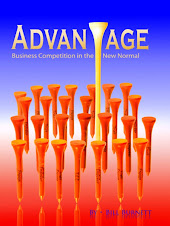
(An excerpt from “Advantage: Business Competition in the New Normal”)
The Value of Knowledgeable Novices
History and experience suggest that the right novice well placed is sometimes the best way to solve a problem. Novices come at a problem without any of the mental moats the expert is unable to ford.
Theoretical physics is a great example. It has long been the domain of the novice. In this context, a novice isn’t someone who lacks knowledge, but, rather, someone who has not yet embraced a point of view or repeated a behavior frequently enough to have ossified a brain pattern. Einstein was just such a novice when he published his four landmark papers in 1905. Most of his thinking at that time was done independently although not always alone. He verbalized ideas to others but was often just talking to himself. It was serendipitous that, while working at the patent office, he reviewed a patent application dealing with the transmission of electric signals and electrical-mechanical synchronization of time. These became the fodder for his thought experiments, which led to his revolutionary insights into the nature of light and the basic link between space and time. He was a novice in the sense that he’d not adopted a point of view; nevertheless, he was very knowledgeable in his field.
In many fields where synthesis is the key to new knowledge, often it is a novice who delivers the breakthrough. In physics and mathematics, PhDs worry as they approach their thirtieth birthdays that they are rapidly losing the opportunity to come up with something truly revolutionary. The notion is that their brains ossify around the knowledge they have and that limits their ability to see something new. This is true in every human endeavor. We should try to leverage this insight in a business context.
When a business faces a problem, using a novice will bring a fresh perspective. What kind of novice do you want? Preferably you want someone with the capacity to see the big picture and who has good synthesis skills. Perhaps you should use someone with a history of problem solving (as distinct from someone who is just good at project delivery). Find someone with a broad set of curiosities who can easily get sidetracked trying to get to the bottom of something. Find someone with all these characteristics, and you have a good chance at getting a fresh perspective on the problem. Don’t be surprised if the experts closest to the problem think the novice has it all wrong. It took about four years for physicists to stop rejecting Einstein’s ideas expressed in his four 1905 papers.






No comments:
Post a Comment